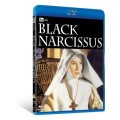| Reviews & Columns |
|
Reviews DVD TV on DVD Blu-ray 4K UHD International DVDs In Theaters Reviews by Studio Video Games Features Collector Series DVDs Easter Egg Database Interviews DVD Talk Radio Feature Articles Columns Anime Talk DVD Savant Horror DVDs The M.O.D. Squad Art House HD Talk Silent DVD
|
DVD Talk Forum |
|
|
| Resources |
|
DVD Price Search Customer Service #'s RCE Info Links |
|
Columns
|
|
|
Black Narcissus
ITV // Unrated // June 23, 2008 // Region 0
List Price: £19.99 [Buy now and save at Co]
If you're browsing this review at a lower resolution and are having difficulties with the formatting, you can disable the screenshots.
During their creative peak throughout the 1940s and early 1950s, Michael Powell and Emeric Pressburger collaborated on any number of films that could justifiably be called masterpieces. Perhaps 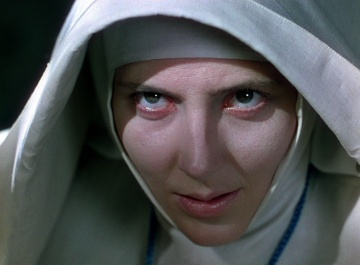 |
| [click on the thumbnail to enlarge] |
Fascinated -- or at least, briefly distracted -- by Christianity, an aging Indian general (Esmond Knight) decides on a whim to convert his former harem into a proper school and dispensary to be staffed by five British nuns. Led by Sister Clodagh (Deborah Kerr), the youngest Sister Superior in their order, they struggle to educate and care for an exotic people wholly disinterested in what Christianity in general and this group of nuns in particular have to offer. Even a fellow countryman (David Farrar) sneers at what he sees as a futile attempt at trying to transform a culture they fundamentally don't understand. With little experience to speak of, these five nuns are forced to rely purely on their faith to guide them, and even that is sorely tested as they're pitted against this seemingly impossible task and the hypnotic thrall of this mountainous, achingly beautiful stretch of India.
Black Narcissus was released just as India was regaining its independence from the British empire, and the timing is fascinating though entirely coincidental. Colonial arrogance -- this false veneer of moral and spiritual superiority -- is one of the driving themes of the film. The sisters' goal is to infuse these savages, who are condescended to and rewarded like a pet dog being taught to roll over, with the civility of Western culture, while the nuns themselves struggle to grasp hold of their own humanity. They overconfidently set out to transform these strange and exotic people, but the Indians are the same at the end of the movie as they are at the outset; it's the nuns who change and not at all for the better. Faiths are shattered, arrogance turns to despair, long-repressed memories once again bubble to the surface, and, for at least one of the nuns, a violent madness starts to seize hold. Black Narcissus explores the conflict between sexuality and spirituality, and it asks -- daringly, for a 1947 film -- if spirituality is something to be shared or silently and reverently held inside.
This is a film in large part about the West's fundamental lack of understanding about the very different cultures they seek to overtake. However, with only one notable exception, the Indians are played by British actors buried under mounds of thick brown makeup, and this adds -- perhaps unintentionally -- to the layer of satire prevalent throughout Black Narcissus. The film deftly juggles its more melodramatic moments with a smirklingly satirical sense of humor, with brief flickers of comedy accentuating the drama
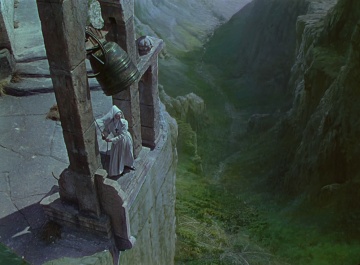 |
| [click on the thumbnail to enlarge] |
Black Narcissus is an astonishingly beautiful film, earning two well-deserved Academy Awards for its art direction and cinematography. The entrancing beauty of India isn't merely a backdrop -- it's one of the driving forces of the story and a character in its own right, in large part inspiring the mental unraveling of the nuns. Black Narcissus does an outstanding job conveying the colossal scope and natural majesty of the Himalayas, and it's all the more impressive that this was accomplished through matte paintings, forced perspective, and an incomparable visual eye, with virtually every last frame of the film shot on a British soundstage. The three-strip Technicolor cinematography by Jack Cardiff is still mesmerizing more than six decades later, and despite Black Narcissus' incisive script and outstanding performances, it would have been a far lesser film without him.
Sensual, satirical, suspenseful, and spellbinding, Black Narcissus is an enduring classic and one of the landmarks of British cinema. Although Black Narcissus has yet to see a domestic release in high definition, Britain's ITV DVD has issued a jaw-droppingly gorgeous Blu-ray disc of the film, and the region-free release is readily available for import. With no indication as of this writing when Criterion might issue their own Blu-ray release on these shores, ITV's disc is essential viewing for home theater enthusiasts with a passion for classic cinema. DVD Talk Collector Series.
Video: Breathtaking. Black Narcissus is
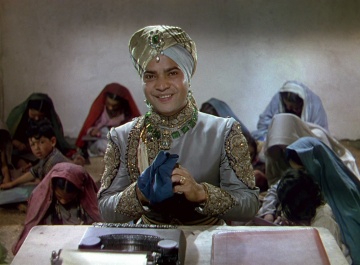 |
| [click on the thumbnail to enlarge] |
This world-class remastering of Black Narcissus is warm, natural, and consistently film-like, easily ranking among the most exceptional Blu-ray presentations I've seen, regardless of age. Like The Seventh Seal, Casablanca, and The Adventures of Robin Hood before it, this disc proves that it's more than just CGI-era blockbusters that stand to benefit from the richer colors and massive boost in resolution that high definition has to offer.
Black Narcissus is presented in its original theatrical aspect ratio of 1.37:1, and this VC-1 encode fits comfortably on a single layer Blu-ray disc.
Audio: Black
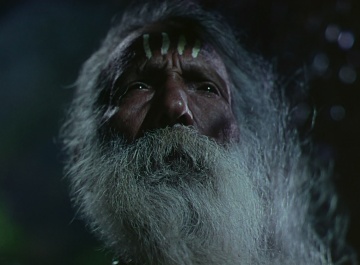 |
| [click on the thumbnail to enlarge] |
There are no alternate soundtracks, but this Blu-ray disc does offer optional English subtitles.
Extras: The extras on ITV's Blu-ray release of Black Narcissus are rather modest compared to several of the more lavish DVD releases of the film. For the overwhelming majority of American viewers importing this disc, there's essentially only one extra: a high definition theatrical trailer.
Also included on this Blu-ray disc is "The Carlton Film Collection: A Profile of Black Narcissus", although because this featurette is presented in PAL, playback will be unreliable on domestic Blu-ray decks. I was able to watch this 24 minute retrospective via the Blu-ray drive on my computer, though,
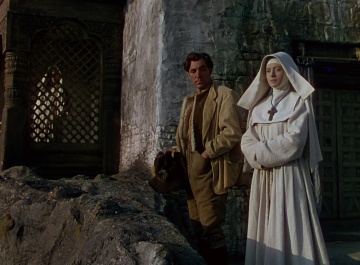 |
| [click on the thumbnail to enlarge] |
Conclusion: Still evocative and startlingly beautiful more than sixty years after it was first released, Black Narcissus ranks among the greatest and most enduring works of British cinema. While it comes as a disappointment that there are so few extras, Black Narcissus is such an exceptional film and boasts such a dazzling high definition presentation that ITV's Blu-ray release is still an essential import. DVD Talk Collector Series.
|
| Popular Reviews |
| Sponsored Links |
|
|
| Sponsored Links |
|
|
| Release List | Reviews | Shop | Newsletter | Forum | DVD Giveaways | Blu-Ray | Advertise |
|
Copyright 2024 DVDTalk.com All Rights Reserved. Legal Info, Privacy Policy, Terms of Use,
Manage Preferences,
Your Privacy Choices | |||||||









